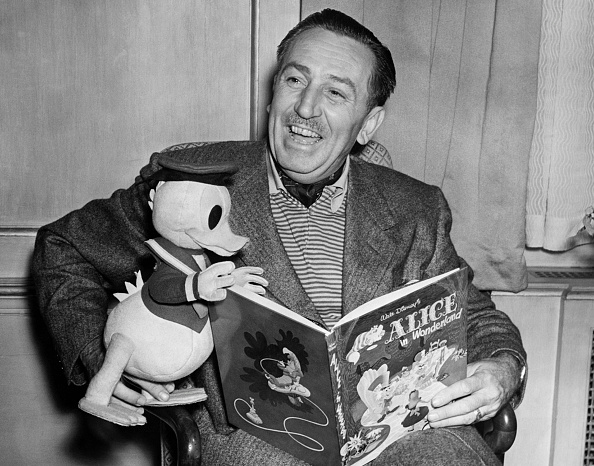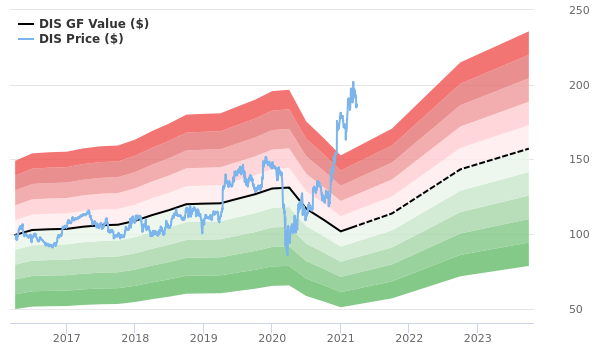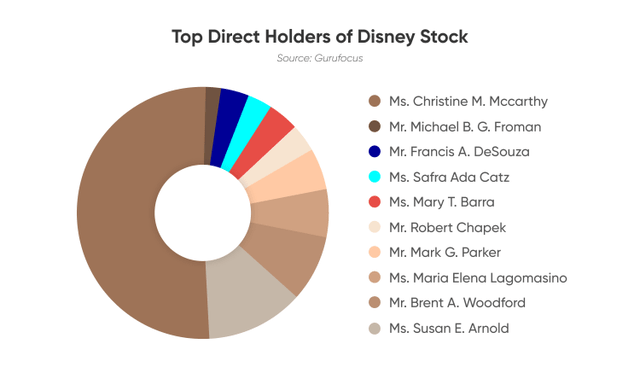Summary:
- Walt Disney’s board of directors remains largely unchanged, which is concerning for shareholders and potential investors.
- The board’s lack of major changes or recognition of the need for a pivot in the business model is not reassuring for the stock price.
- Activist investor Nelson Peltz has challenged the board, alleging that they have not shown a believable pathway to increasing the company’s valuation.
FiThe Disney that was is not the Disney that is–investors need a new vision going forward. Hulton Deutsch/Corbis Historical via Getty Images
Last week, Walt Disney (NYSE:DIS) CEO Bob Iger announced the company’s candidates for the board. Surprise. The surprise, it turns out, is that the ole gang of mine remains in place. It’s not great news for shareholders or would be dippers into the stock, even at its current trading range well below its accustomed high pre-covid.
The only apparent change was the welcome news that Mr. James P. Gorman of Morgan Stanley had joined the board. His presence we assume is a response to perceived pressure brought on by the restiveness of Mr. Nelson Peltz’s bid for two board seats. And Gorman will be valuable indeed as the presumed proxy fight ensues. Meanwhile we have the same board crew overseeing who’s minding the store and that’s not entirely good for the stock price.
With all due respect to the Disney board members collective accomplishments, we still get the sense of their being rubber stamping bobble head dolls, nice and comfy in their DIS feathered nests. They are, for the most part, the same board that apparently sat through the disruptive forces that have hit the industry since 2019 and are still slugging away at the DIS business model. And more pointedly, the same crew who nodded yes to the appointment of Bob Chapek (CEO 2020-2022) to succeed Iger and likewise approved the volte face in showing him the door two years later. And their best idea for a successor was the guy who sent in Chapek in the first place.
Let’s stipulate the DIS board are all highly successful people with long resumes that include educations from the best business schools in the land. These are people who have made worthy, energetic climbs up their corporate ladders and in some cases had direct connective tissue to US Presidents.
Above: Many directors hold stock which is good, but raises why they have not been more proactive for major change.
In brief, they are very representative of many boards of directors in tons of US companies chosen for resume glitter first and not the relevancy of their careers to the business of the companies upon whose boards they serve. Skill sets are transferable of course. We get it. A savvy, strong leader need not be drenched in the same business on the boards of the companies they serve in order to provide prudent guidance. But its undeniable that a deep dive showbiz veteran with a track record would make a fine DIS director.
In the real world, directors are mostly in thrall one way or another to senior management cronyism. They are retained to obey, not object and make sure the CEO stays off the public hot seat as much as possible. For that they get nice resume lines, unique director perks up the wazoo and a hefty clink of the tip jar for every meeting they attend. It helps if they prove they can stay awake during power points meticulously created by senior management to justify their fat options deals.
We note here the career of Mr. Carl Icahn who has built a multi-billion dollar (temporarily bruised) fortune on the premise that far too many corporate boards are extensions of DEI stamped good ole boys and girls country clubs. Good for them, they’ve earned it. But, in my honest opinion, the DIS crew has frankly passed their sell dates to many shareholders now deeply underwater from their entry points. Can anyone realistically project that decisions thus far will bring DIS shares back to anything near $150 to $200?
What needs to happens is some evidence that the board has risen to the occasion to demand structural changes in the DIS corporate business model. What we have seen thus far is tweaking, which is fine, but nothing that tells us the board recognizes the time has come for a major pivot.
Shareholders need some sense that the board is holding managements’ feet to the fire beyond parroting what comes out after earnings releases. Unfortunately, our flies on the wall are busy elsewhere. What grumbling or board dissent may remain locked behind DIS board room doors will never be fully known. And we agree washing dirty management linen in public hardly makes any sense at all.
It is always up to the likes of activists like Peltz to do the public washday chores for insular managements like DIS.
So now arrives billionaire Mr. Nelson Peltz who has challenged the Mount Olympus of the DIS gods by alleging that, in plain English, neither they, nor the management they presumably supervise, have yet to show a believable pathway back to a far richer valuation for their shares.
In brief, the Jerry McGuire Cuba Gooding Jr. movie line is emanating from Peltz:
Show me the money!
google
Above: The question of whether the stock is overvalued is shown.
No surprise either that Iger has re-nominated himself and, as expected, and also dismissed Peltz and Radulo’s demand to push themselves onto the board. That’s a story in early chapters. Whether Peltz gets anywhere or not is part of a longer story of which this is not the forum. That said, there is enduring truth in the simple admonition that does say: Moves taken so far are fine, but fall very short of what holders need to see.
In brief, the industry is roiling in revolution, and revolutionary change should be the order of the day for DIS.
Our view here is not simply an effort to go beyond a 15th century Savonarola type role fulminating about a collapse of steeliness of purpose. We took a long hard look at the board, person by person with a single thought in mind: What have they done so far that would give investors high conviction that they really have their arms around the challenges? And despite the moves already made, are they prepared to examine the step we and others have mulled:
Is it time to break up the company? We have in it another case like Paramount where it’s hard to deny that the whole is worth far more than the parts.
So we could conjecture case closed in as far as Mr. Peltz is concerned. A sifting through company verticals division by division under best case, base case or worse case scenarios would appear to support the simple premise of the assets not generating what they should be given their intrinsic value. It is certain that the esteemed DIS board knows this for certain.
An assessment of the value of DIS assets $205.6b
DIS market cap: $179b.
Price at writing $93.06
March 2021 high: $197.00
Intrinsic value per alpha spread:
Base case: $121.81
Worse case: $99.9
Best case: $166.19
Our own calculation, taking into account the current mess in big media, sees all the main players in the space breaking up. They should be transformed into more logical verticals with a terminal value in my view at Best case $104.60. Worse case: $82
Best case assuming management gets its arms around tough but smart solutions: $213 a share with its debt halved.
Holders are entitled to know more about boards of companies in which they hold stock than one paragraph resumes on their home websites. We are not interested in what these people have with their breakfast shakes, or if they attend their kids’ little league or dance recitals. We have zero interest in their lives outside of business, and of course, we wish them well.
Entertainment is a business of non-recurring assets. You sell a can of Heinz baked beans to a happy customer once, and forever – it’s the same can of beans. The movie theater as a super market does not sell the same can of beans to the same customer every week. Each production is a do over, is a test unto itself of the entire company’s fragile hold on the customer. This is no easy business these days and investors need to disabuse themselves that solutions will come fast or easy in the intermediate term.
The insular world of board room accommodators
The DIS board is an exemplar of a kind of what I call tolerable cronyism that has infected corporate America like a variant of an old virus: double back scratching. You assemble a board of respected individuals, checking every possible box of DEI in the process-fine. You then reverse what a board is supposed to be: Representatives of the shareholders – nothing else until recent years when like barnacles to a ship, other responsibilities beyond shareholder rights affixed themselves to the corporate boats.
And as long as those newly coded rights didn’t interfere with the core mission of boards, it was fine. Just keep the earnings rising, be smart with asset allocations, take care of good employees, check the DEI boxes, be supportive or tough based on results over time.
When management does not perform, change it, shuffle it, restructure it, do something. Don’t just sit there, watching management’s Cecil B. deMille power points. Been there, done that. Challenge, view with alarm, ask those extra questions that all wind up compressed in the simple line:
Show me the money.
Instead what we have evolved to is that management has become the board and it asks and answers both the questions and the answers alike. Of course, DIS is hardly alone here. The sector faces a landslide of watershed threats that show no sign of abating, particularly among the streamers.
We do not presume here to enlist ourselves as buck privates in the Peltz army marching to his tune. His agenda is clear to DIS: The best analogy is to be found in pro sports free agent deals. You sign Hall of Fame level players for monster long term contracts. Unaccountably, many never play to the glories of the back of their baseball card stats. So you wind up stuck with dead money contracts guaranteed for years upon years ahead while they underperform. So what do you do? You pay the money through gritted teeth and keep happy talk going to the fans. Or you fire a manager or a coach, juggle the lineup, and stage more giveaway t-shirt days.
Or mostly, if you don’t believe in the DIS moves thus far, you are probably best advised to sell now depending on your entry point. But If you have the patience to keep money on the DIS high hopes table, then a HOLD continues to be the move to the next series of results. Overall, I tried to make a case to BUY as have other followers of the stock, but frankly I couldn’t. My standards are those of a c-suite veteran, right or wrong, not algorithm specific as may be the case for bulge analysts.
The analogy: DIS and its legacy businesses and IP
At first, holders have to ask themselves: What should we expect from a board of directors who not only presided when the you know what hit the fan? A board who also rubber stamped an Iger successor and then acquiesced to his walking of the plank. Chapek was not a singular swing and miss by the DIS board. Its endemic in corporate America these days. Boards may give constant lip service to the idea that they serve shareholders but in reality they are mostly the servants of management. That’s something to remember when you place your buy order on any stock with a quiescent board.
Conclusion
If you are a DIS holder content with the general direction in which the board and Iger’s team is moving the company amid the media tsunami, your downside risk in a HOLD may lie somewhere between $78 and $81. If you don’t see anything that vaguely resembles a promised land ahead, it is not heresy for you to SELL DIS and find a better place for your money. The fact is that you own the stock of a company which is not what it was and is still uncertain as to what it will be.
Analyst’s Disclosure: I/we have no stock, option or similar derivative position in any of the companies mentioned, and no plans to initiate any such positions within the next 72 hours. I wrote this article myself, and it expresses my own opinions. I am not receiving compensation for it (other than from Seeking Alpha). I have no business relationship with any company whose stock is mentioned in this article.
Seeking Alpha’s Disclosure: Past performance is no guarantee of future results. No recommendation or advice is being given as to whether any investment is suitable for a particular investor. Any views or opinions expressed above may not reflect those of Seeking Alpha as a whole. Seeking Alpha is not a licensed securities dealer, broker or US investment adviser or investment bank. Our analysts are third party authors that include both professional investors and individual investors who may not be licensed or certified by any institute or regulatory body.
The House Edge is widely recognized as the only marketplace service on the casino/gaming/online sports betting sectors, researched, written and available to SA readers by Howard Jay Klein, a 30 year c-suite veteran of the gaming industry. His inside out information and on the ground know how benefits from this unique perspective and his network of friends, former associates and colleagues in the industry contribute to a viewpoint has consistently produced superior returns. The House Edge consistently outperforms many standard analyst guidance with top returns.
According to TipRanks, Klein rates among the top 100 gaming analysts out of a global total of 10,000.

